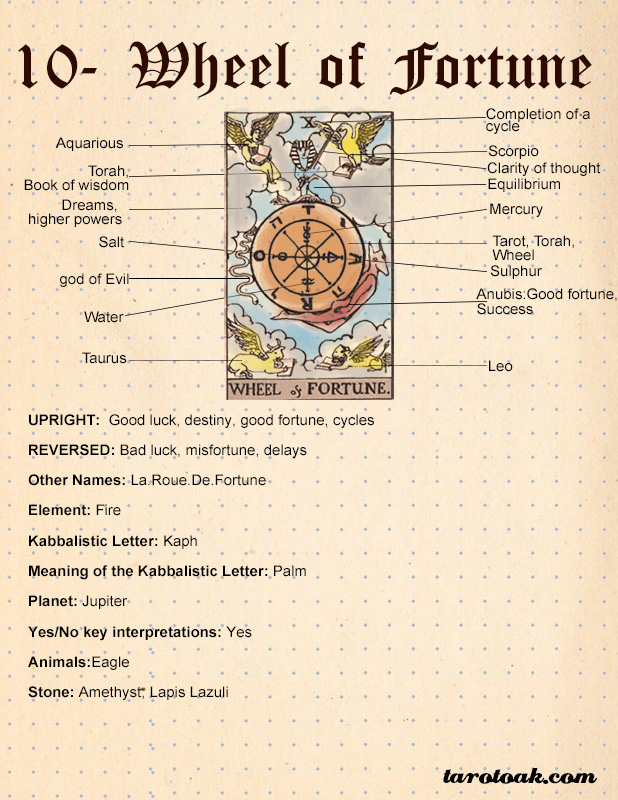The Wheel of Fortune tarot card, with its vibrant imagery and intricate symbolism, serves as an intriguing fulcrum upon which the metaphysical and the mundane intersect. Within a Christian perspective, this card takes on profoundly multifaceted meanings, resonating with scriptural insights and theological nuance. It beckons the faithful to navigate the cyclical nature of existence, an enduring testament to the inextricable links between divine providence and human experience.
At its core, the Wheel of Fortune encapsulates the idea of divine sovereignty. Just as the wheel spins, the fortunes of individuals are subject to the whims of fate, yet within this capriciousness lies a profound divine order. The Christian doctrine posits that God, in His omnipotence, orchestrates the events of our lives. This reality invites contemplation: are we at the mercy of random chance, or is there a celestial choreography at play? The card urges believers to reflect on the ultimate control that God has over their paths, much like how a potter molds clay into vessels of purpose.
In Christian theology, the cyclical nature of life is echoed in the concept of seasons—spiritual, emotional, and physical. Just as Ecclesiastes 3:1 articulates, “To everything, there is a season, and a time for every matter under heaven,” the Wheel of Fortune symbolizes the transitions that punctuate our lives. The ascents and descents depicted in the card represent the myriad experiences that shape our faith journey. The message here is clear: embracing both the joyous and the sorrowful moments is crucial to spiritual growth.
Another noteworthy aspect of the Wheel of Fortune is its alignment with the concept of divine grace. In Christianity, grace is not merely a theoretical construct but a tangible manifestation of God’s love. The wheel’s rotation is akin to the notion of cyclical grace—an expanse that envelops individuals regardless of their station in life. This dynamic serves as a reminder that when fortune shines brightly or obscures the light, God’s grace remains constant, providing strength and solace amid tumultuous times.
Moreover, the presence of the four creatures at the corners of the Wheel of Fortune card—often depicted as a lion, an eagle, an ox, and a human—draws correlations with the four Gospels: Mark, John, Luke, and Matthew. Each Gospel, akin to the creatures, offers unique perspectives on the life and ministry of Christ. This interweaving of symbolism emphasizes a holistic approach to understanding divine fortune; just as the Gospels inform the Christian experience, the Wheel of Fortune encapsulates the broader, cyclical ebbs and flows of life guided by faith and the divine narrative.
Conversely, within the Christian outlook, the card also connotes a warning against hubris. The implications of the wheel’s movements suggest a call for humility, with its fortune reminding believers that their current state—be it wealth, health, or happiness—is transient. James 4:14 notes that “you are a mist that appears for a little time and then vanishes.” Hence, the fleeting nature of worldly success should foster gratitude rather than arrogance. The Wheel serves as a reminder of our shared human fragility, inspiring believers to cultivate a heart of compassion towards others, regardless of their circumstance.
Additionally, the Wheel of Fortune card elicits contemplation around the choices that shape destiny. The notion of free will plays a crucial role in Christian teachings, wherein individuals are endowed with the capacity to choose between good and evil. The turning of the wheel can be seen as a metaphor for the results of these choices—each decision spinning the wheel in different directions. When one chooses to align actions with divine will, they essentially direct the wheel towards grace and blessings, whereas choices rooted in selfishness may result in turmoil and trials.
The juxtaposition of fortune and faith within the Wheel of Fortune accentuates the importance of trust. As believers maneuver through the uncertainties of life, it is their faith that steadies their course. Proverbs 3:5-6 encourages adherents to “trust in the Lord with all your heart and lean not on your own understanding.” This trust acts as a catalyst that converts anxiety into assurance amid the wheel’s unpredictable rotations. It is through faith that believers are able to maintain perspective and embrace the transformative power inherent within both the highs and lows of their journey.
Moreover, the Wheel of Fortune card invites contemplation on the collective experience of humanity. The cyclical patterns depicted remind believers that they are not alone in their struggles or triumphs; history is a testament to the shared nature of existence. Every generation encounters its own challenges, yet each life is intertwined with biblical promises of restoration and redemption. The Christian perspective emphasizes the hope that comes with trusting in God’s plan, reinforcing the idea that even when life feels like it is spiraling out of control, divine guidance remains steadfast.
In conclusion, the Wheel of Fortune tarot card is both a powerful symbol and a call to introspection within the Christian faith. Its intricate motifs of divine providence, the dynamics of free will, and the necessity of trust converge, creating a rich tapestry of meaning that resonates with the believer’s journey. By embracing both the fortunes and misfortunes of life, Christians are invited to take solace in the unwavering presence of divine grace, ensuring that every rotation of the wheel ultimately leads them closer to the heart of God.







Leave a Comment